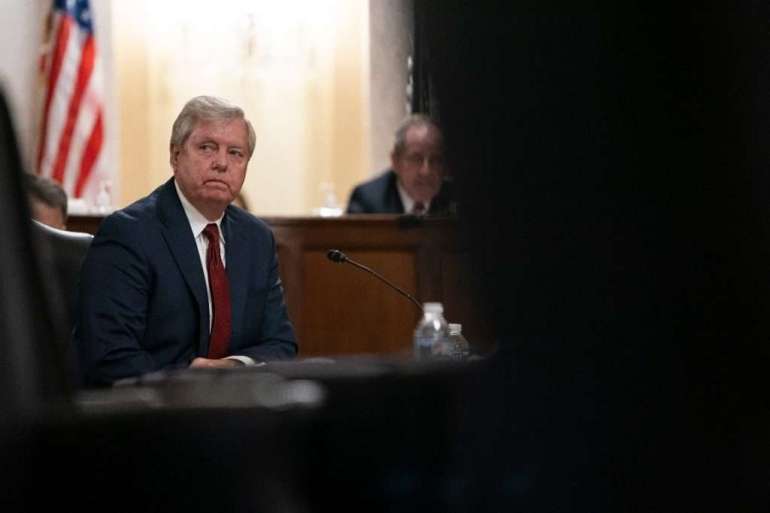Republicans take on Biden’s Cabinet, but without the Trumpian fury

“I think it’s very, very important that we have a secretary of Homeland Security in place as soon as possible,” Sen. Mitt Romney (R-Utah) told reporters.
But Tuesday’s confirmation hearings also showed that Biden could soon run into the scorched-earth politics that Democrats lament have seized much of the Republican Party. Sen. Josh Hawley (R-Mo.) declared that he would object to swift consideration of Biden’s nominee to lead the Department of Homeland Security, Alejandro Mayorkas, all but ensuring Biden won’t have some of his top national security officials confirmed on Inauguration Day, as Trump and his predecessors did.
Mayorkas came under scrutiny at his hearing from some Republicans over a 2015 inspector general report outlining allegations of politically motivated favoritism in the issuance of visas, which he rejected. But Hawley’s objection focused on what the Missouri Republican perceived as Mayorkas’ hostility to border-security measures that he and other immigration hard-liners support.
Still, the fact that it was a policy-driven focus was yet another sign that Republicans of all stripes may be looking to turn the page from the Trump presidency, which was marked by endless controversies, tweets and investigations that seriously hampered Trump’s presidency. Republicans may still try to block much of Biden’s legislative agenda, but they’re ultimately not going to fight him on every appointment.
Soon-to-be Majority Leader Chuck Schumer has called on the Senate to confirm Biden’s national security nominees on Inauguration Day. Such a move wouldn’t be unusual. Trump had his Pentagon and Homeland Security nominees confirmed on his first day as president in 2017. But Biden will need Republican cooperation to catch up to that pace — especially with an impeachment trial looming over the chamber.
“President Biden should have the same officials in place on his inauguration day at the very least,” Schumer said. “That is the expectation and tradition for any administration, especially now in the midst of a homeland security crisis.”
In a letter to the GOP conference obtained by POLITICO, Senate Majority Leader Mitch McConnell told members that the Senate could vote Wednesday afternoon on Cabinet nominees.
The looming impeachment trial for Trump on charges he incited the deadly siege at the Capitol could pose difficulties for Biden as he looks to enact his agenda. Some top Republicans are calling on Biden to ask Democratic leaders to call off the trial so that the chamber can focus on other business, though Schumer has already affirmed that the Senate will hold a trial.
“I would like [Biden] to get up and running, but he has to help,” Sen. Lindsey Graham (R-S.C.) said. “If we go into impeachment, he has nobody to blame but himself because we’re going to be focused on impeaching the president, you can’t do both at once.”
While Speaker Nancy Pelosi continues to delay formal transmission of the impeachment article, thereby pushing back the start of the trial, several Republicans were joining Democrats’ calls for quick confirmations in the meantime.
Among the slate of nominees appearing before the Senate on Tuesday was Avril Haines, Biden’s nominee to be director of national intelligence. Sen. Marco Rubio (R-Fla.), the incoming vice chair of the Intelligence Committee, said he wanted to “fill this critical national security position as early into the Biden administration as possible.”
Meanwhile, the Senate Finance Committee’s hearing for Janet Yellen’s Treasury Secretary nomination was a stark contrast to that of Trump Treasury Secretary Steven Mnuchin. The former film producer and investment banker had faced deep skepticism from Democrats; no one took issue with the credentials of Yellen, a former Federal Reserve chief.
While Senate Republicans foreshadowed disagreements with Yellen, they kept their questions centered on policy, including the tax code and the size of the national debt. Yellen’s confirmation should ultimately go smoothly.
Sen. Pat Toomey (R-Pa.) also expressed concern with Biden’s coronavirus relief plan, a sign that GOP support for another stimulus package might be shaky.
“I look forward to working with you but I have to admit the contours of the stimulus bill as proposed by the Biden administration are going to make that difficult,” Toomey said at the hearing. “The only organizing principle that I can discern is that it seems to spend as much money as possible seemingly for the sake of spending it.”
Aside from Toomey and a handful of others, most in the GOP avoided acknowledging that Trump presided over a flood of red ink. With Biden in the White House, concerns over rising budget deficits are sure to return.
Antony Blinken, Biden’s nominee for secretary of State, as well as Pentagon nominee Lloyd Austin, also faced cordial receptions from Senate Republicans, but not without criticism.
Sen. John Barrasso (R-Wyo.) told Blinken that “it’d be a grave mistake to confirm a secretary of State who has a demonstrated track record of repeatedly making the wrong decisions when it comes to American foreign policy and national security.”
And Sen. Tom Cotton (R-Ark.), a potential 2024 White House contender, announced Tuesday he would oppose a waiver allowing Austin to become defense secretary, which is necessary because Austin has been out of the military for less than seven years. The hawkish GOP senator voted for the waiver to allow Jim Mattis to become Trump’s defense secretary.
While Biden can ultimately see his nominees confirmed with a simple majority, his broader agenda will need cooperation from a Senate that is now evenly split, allowing no room for Democratic dissent and requiring Republican input on most bills.
During his floor remarks Tuesday, McConnell warned that the 2020 election results suggested that neither party had an explicit mandate from voters.
“Americans elected a closely divided Senate, a closely divided House and a presidential candidate who said he’d represent everyone,” McConnell said. “We are to pursue bipartisan agreement everywhere we can and check and balance one another respectfully where we must.”
Zachary Warmbrodt and Natasha Bertrand contributed to this report.